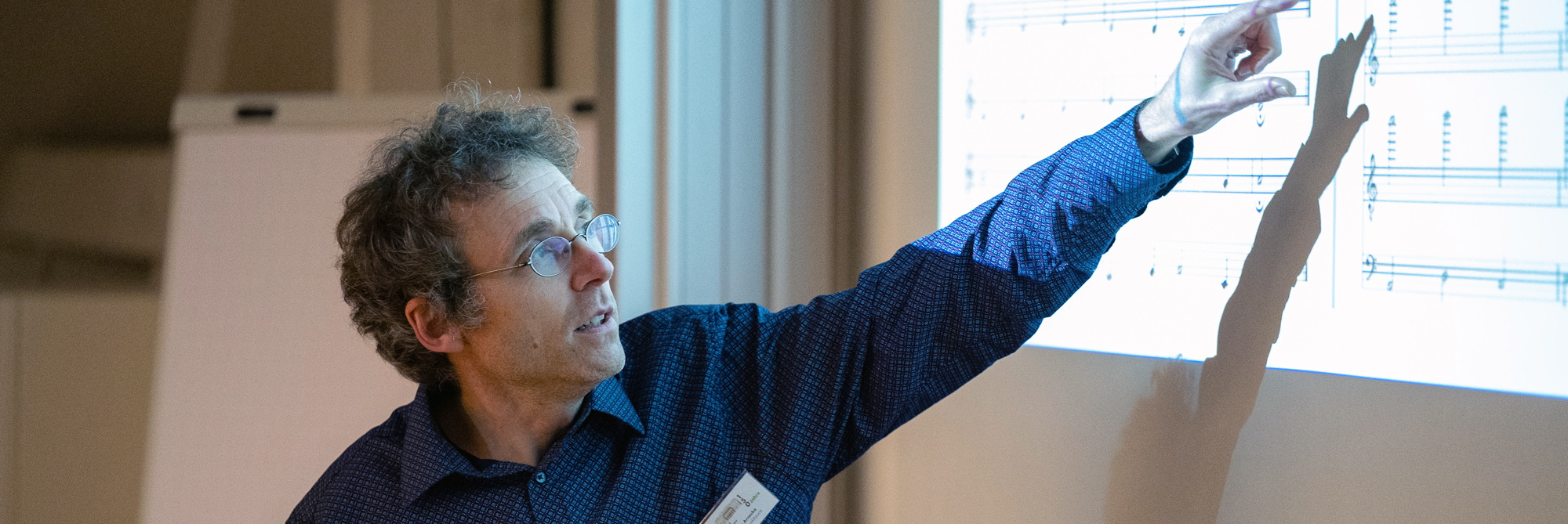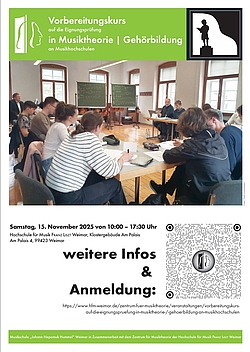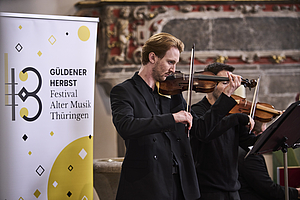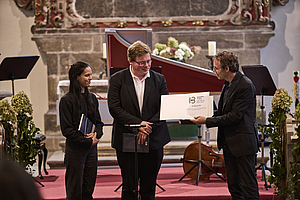Centre of Music Theory
Music Theory represents the interface between artistic and academic endeavours. As a result, students are educated and trained on two levels.
Graduates have access to a broad spectrum of professions, whether at university-level teaching, publishing houses, media companies or music schools.
Vorbereitungskurs Musiktheorie
Die Anmeldung zum Vorbereitungskurs auf die Eignungsprüfung der Fächer Musiktheorie / Gehörbildung finden sie hier.
Das Angebot richtet sich nicht an Bewerber*innen für Jazz-Studiengänge.
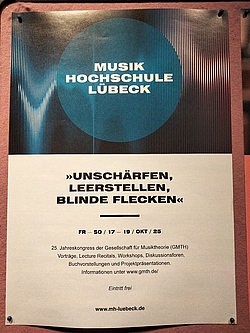
Exkursion zum GMTH Kongress 2025 in Lübeck
Vom 17.–19.10.2025 fand der 25. Jahreskongress der Gesellschaft für Musiktheorie (GMTH) statt. Auch Studierende und Lehrende des Zentrums für Musiktheorie reisten dafür aus Weimar nach Lübeck. Das Thema des Kongresses lautete in diesem Jahr "Unschärfen, Leerstellen, blinde Flecken".
Prof. Marcus Aydintan war erneut als einer der beiden Jury-Vorsitzenden für den künstlerischen Wettbewerb der GMTH verantwortlich und überreichte die Preise im Rahmen einer „Abendmusik“ mit Werken und Rekonstruktionen zu Dieterich Buxtehude. Dozent Ehsan Mohagheghi Fard sowie die Studentin Kanaz Difrakhsh brachten sich mit Einzelvorträgen ein. Der Kongress ermöglichte außerdem die Vernetzung innerhalb des Fachbereichs für Musiktheorie: In der "Arbeitsgemeinschaft Musikunterricht" entwickelte Prof.in Elke Reichel das geplante Panel der AG bei der nächsten Weimarer Tagung (20./21.3.2026) zum Thema „Das Elementare und das Komplexe“ weiter; Prof. Jörn Arnecke stellte das vorgesehene Programm bei der Versammlung der Hochschulvertreter*innen vor.
Auch der Büchertisch des Nomos-Verlages lud zu Gesprächen und Erkundungen ein: Hier lagen u.a. die letzten Publikationen der Weimarer Schriftenreihe „Paraphrasen“ aus - der Band zu den Libretti von Reinhard Febel (herausgegeben von Prof. Marcus Aydintan) und die Monographie „Aufklänge“ des ebenfalls anwesenden Dr. Florian Kleissle zu Werk und Werdegang von Siegmund von Hausegger.
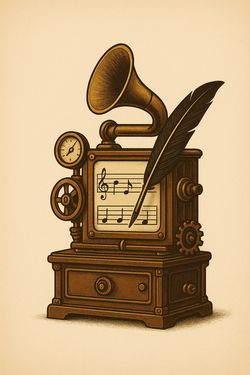
Musikautomat - The machine for the next cycle
The Music Automaton is first and foremost an educational tool that creates musical “sketches” rather than complete compositions. Think of it as a musical fantasy machine that largely ignores formal structures but captures the style of a composer.
We developed Quill to spark curiosity:
Why does this sound like Bach and that like Mozart?
And what would happen if Joplin continued this Scarlatti piece?
The Music Automaton emerged from a research project at the University of Music Franz Liszt Weimar, funded by the Stifterverband and the Thuringian Ministry for Economy, Science and Digital Society. The project explores the potential of AI models in music education - specifically within higher music education.
The AI was trained exclusively on a hand-picked, curated, and custom dataset of more than 6,000 classical compositions. In the world of AI, this is a VERY small dataset, which makes Quill’s performance all the more remarkable.
For more information and access to the Music Automaton, click here.
Erasmus Conference "Music and Time" at the CLAUDIO MONTEVERDI Conservatory in Bolzano
As part of the Erasmus Conference“Music and Time”, a group of students and faculty from the University of Music FRANZ LISZT Weimar visited the “Claudio Monteverdi” Conservatory in Bolzano from April 13 to 17, 2025. Participants included members from the departments of Music Theory, Early Music, Music Education, and the Trombone Class.
During the four-day stay, students and lecturers from the HfM Weimar contributed to a diverse program of lectures and workshops. In addition, they had the opportunity to observe classes in music theory at the Bolzano Conservatory. In one session, students of the Weimar major program in Music Theory and their instructors worked together with students from Bolzano on baroque-style composition exercises. The excursion concluded with a joint concert featuring Early Music students from both Weimar and Bolzano.
Weimar University of Music impressed at Hörprobe on Deutschlandfunk Kultur
The FRANZ LISZT University of Music Weimar presented itself on February 4 as part of the Deutschlandfunk Kultur concert seriesHörprobe under the motto Teamplay. The concert in the Fürstenhaus Festival Hall was broadcast live on the radio and showcased the university’s musical diversity with original works, arrangements, and improvisations in exciting ensembles.
Music theory played an active role in the program: Music theory and piano students had composed waltzes in the style of Johannes Brahms, which were performed as piano duets. This creative engagement with stylistic elements demonstrated the close connection between theory and practice. In addition, there were further cross-genre collaborations, such as between the pop vocal ensemble and the trumpet class or between accordion and guitar.
Between the pieces, the performers took part in conversations with radio journalist Carola Malter. Hörprobe thus not only provided a stage for musical excellence but also offered insights into the education and artistic processes of the young musicians.
For more information, please click here.
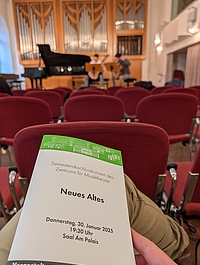
"Neues Altes": Semester Final Concert of the Music Theory Department
On January 30, 2025, the semester final concert of the Center for Music Theory took place under the title Neues Altes (New Old). In the Saal am Palais, students from the main subject class as well as students from other disciplines presented their compositions, which had been created over the course of the winter semester.
Music theory was showcased in a diverse manner: from stylistically bound inventions, fugues, and minuets to free compositions in contemporary music and pop/jazz arrangements. The topic of artificial intelligence was also revisited, with some pieces based on thematic motifs generated by AI.
The contributions emerged from courses taught by Prof. Jörn Arnecke, Marcus Aydintan, Roman Engelhardt, Dr. Florian Kleissle, Ehsan Mohagheghi Fard, and Jörn Marcussen-Wulff.
Excursion to the GMTH Congress 2024 at the BTU Cottbus-Senftenberg
From October 4-6, 2024, the annual conference of the Society for Music Theory (GMTH) took place. On this occasion, students and faculty from the Center for Music Theory in Weimar traveled to Cottbus. The theme of the 24th Annual Congress was "Musiktheorie im Wandel" (engl. "Music Theory in Transition"). The students not only attended the many different workshops, lectures, and discussions, but also contributed with their own presentations. As a joint presentation, three students from the music theory class presented the project from the concert at the "Güldener Herbst." Furthermore, the conference provided a great opportunity for diverse networking with other universities, teachers, and students in the field of music theory.
"Junges Podium" – Performances of Baroque Cantatas from the Weimar Music Theory Class
As part of the "Güldener Herbst - Festival of Early Music Thuringia," three cantatas composed by Weimar music theory students were performed at the "Junges Podium" concert on September 28, 2024, in Gotha. These pieces were the result of the main subject classes from the previous semester. Cantatas from the Anton Ulrich Collection in Meiningen (see contribution below) were used as historical models and textual foundations to create new "old" style imitations. During the concert, the historical originals were juxtaposed with the new stylistic compositions. The audience heard both versions and was invited to guess, through a vote, which was the "original" and which was the "style imitation."
Three cantatas, each consisting of two recitatives and two arias, were created through this collaboration. They were performed by students from the Institute of Early Music at the university.
The audience prize was awarded to Lisa-Marie Haid and Georg-Friedrich Wesarg (see photo).
For more informations, photos and the concert film click here.
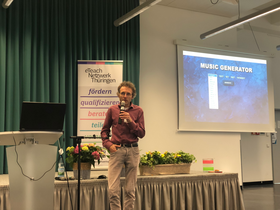
AI composes historically
The "Music Generator" goes online! A first prototype is available and allows the generation of music from past eras, sorted by composer, genre, key and time signature. The application was programmed by Alex James Vaughan under the artistic direction of Prof. Jörn Arnecke. He presented the project at the eTeach dialog forum (photo: Dorothea Warneck). On June 5/6, the "Music Machine" made a guest appearance at the University Future Festival in Berlin, where it was presented by Prof. Jörn Arnecke and student assistant Sebastian Oliver Eck.
Jörn Arnecke will presented the "Musik-Automat" once again on June 20 as part of the Bauhaus University's Talks@eTeach series. You can find a video recording of the interview here.
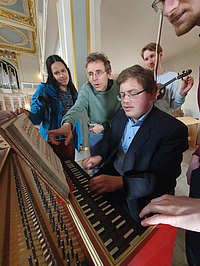
Excursion to Meiningen - project for this year's "Güldener Herbst - Festival Alter Musik Thüringen"
On April 18, students explored the Anton Ulrich Collection of the Meiningen Museums with Prof. Jörn Arnecke. Under the direction of Dr. Maren Goltz, copies of Italian cantatas from the 18th century were examined and performed in the Schlosskirche on a trial basis. In the spirit of artistic research, the students will analyze the musical texture and compose new works in the same style. Early music students will perform the results in a concert on September 28, 2024 at 4 p.m. in the Augustinerkirche Gotha.
Other highlights of the excursion included the students leafing through manuscripts by Max Reger and marveling at the exhibition with objects from Reger's estate and numerous instruments from the Meiningen collection.
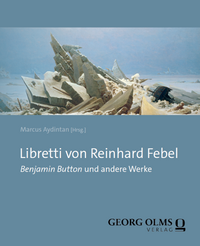
Newly published: Libretti by Reinhard Febel. Benjamin Button and other works (edited by Marcus Aydintan)
The new volume of the series Paraphrasen - Weimarer Beiträge zur Musiktheorie (Paraphrases - Weimar Contributions to Music Theory), which is dedicated to the libretti of the composer Reinhard Febel (*1952), has recently been published. Febel's music theatre works span a thematic arc from fantastic and strange events to science fiction - some are about historical figures such as Oswald von Wolkenstein or Howard Hughes, while in others famous paintings come to life as stage sets.
The edition contains all the libretti written by the composer himself, including that of the recent opera Benjamin Button, which celebrated its premiere at the Landestheater Linz on 6 April. In accompanying essays, Jörn Arnecke, Marcus Aydintan, Jeffrey Arlo Brown and Ulrich Alexander Kreppein reflect on Reinhard Febel's music.
Why study Music-Theory in Weimar?
The Master’s degree in Music Theory in Weimar is characterised by its great practical relevance. Students are prepared for potential teaching roles via tutorials and courses, in conjunction with the "Johann Nepomuk Hummel" music school in Weimar.
Teachers cover a broad spectrum of music theory, from medieval music through to the present day, from composition through to musicology.
Projects for "Innovations in university teaching" demonstrate the wealth of ideas with which new developments are incorporated into the teaching programme - currently artificial intelligence.
The Centre for Music Theory presents the conference "Musiktheorie und Hörerziehung" every year, which is renowned across Germany, in collaboration with the Gesellschaft für Musiktheorie (GMTH).
The book series "Paraphrasen – Weimarer Beiträge zur Musiktheorie" ("Paraphrases" – Contributions to Music Theory from Weimar’), published by Olms Verlag, opens up the opportunity to have outstanding papers published.
With its excellent tradition of spiritual history, Weimar is a stimulating environment within which to bring together art and academic research.
